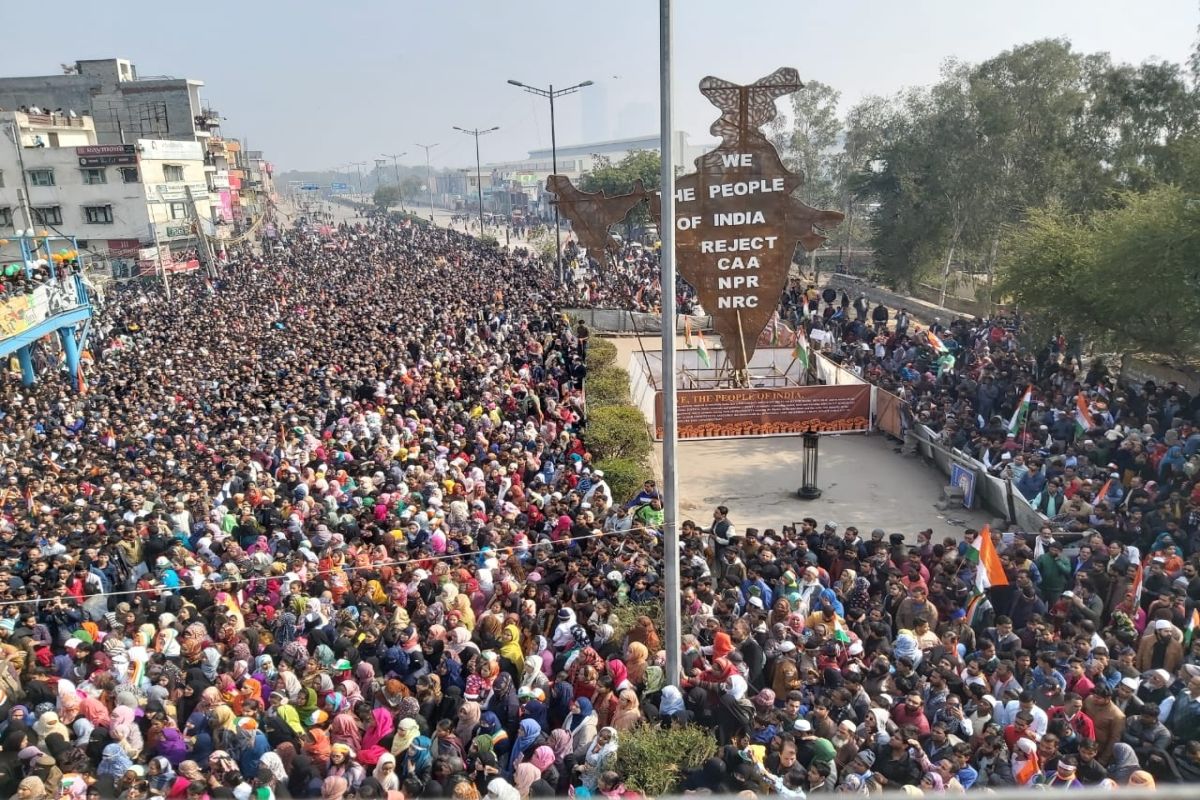Shaheen Bagh has been the epicentre of the anti-CAA agitation as the protesters have been sitting at the venue since December 15 demanding the withdrawal of the Act which they alleged to be anti-Muslim.
SNS Web | New Delhi | February 21, 2020

Days after the Supreme Court appointed mediators in a bid to end the Shaheen Bagh stalemate, a key road, which had been shut due to the protests against the Citizenship Amendment Act (CAA), was on Friday re-opened by the police 69 days after it was barricaded.
The Noida-Faridabad road, near Shaheen Bagh — the epicentre of the agitation against CAA, NRC — was opened briefly for about 40 minutes to ease traffic congestion.
The apex court had on Monday appointed two advocates and a former bureaucrat as mediators to talk to the protesters, who are on a sit-in for over two months, and find a solution to the problem.
Following this, Senior Advocate Sanjay Hegde and lawyer Sadhana Ramachandran met the protesters on Wednesday and Thursday in a bid to break the deadlock over reopening of the blocked stretch in south Delhi.
Both lawyers along with former top bureaucrat Wajahat Habibullah told the women protesters in clear terms that a peaceful solution would have to be arrived at through talks or else the government could take steps.
Hegde said the protesters fear that if they moved out from the spot, nobody would hear them out on the CAA. However, he assured them that nobody will be able to suppress their voice till the Supreme Court was there.
The protesters reiterated their stand that they would disperse if the controversial Citizenship (Amendment) Act was withdrawn by the Modi government. They said they would appeal to Prime Minister Narendra Modi to either include all religions in the ambit of the new law or scrap it altogether.
They insisted that the Shaheen Bagh protest should not be viewed in isolation, but symbolic of all the protests occurring across the country on the CAA, National Register of Citizens and National Population Register.
The protesters said they had been forced to come out on the streets to protect the rights of the people.
Accusing the government of trying to remove them from the protest site through legal and illegal methods, the women protesters pointed out to the police action against those who had raised their voice against the controversial law.
Asserting that both sides have to come up with a solution to the road blockade through cooperation, Ramachandran told the protesters that the dialogue had to be taken forward sincerely and that the apex court was already seized of the CAA issue.
She pointed out that the panel had already been blessed by the grandmothers or ‘dadis’ leading the protest on the spot since December 15, 2019.
She cautioned that if the talks did not lead to any solution, they will report back to the Supreme Court, and the buck will then pass on to the government thereafter.
However, she insisted, there was no issue which could not be resolved.
Sanjay Hegde, on his part, tried to reason that the court was of the view that the protest should be held at such a place which does not inconvenience the public.
Ramachandran told the protesters that given the noise levels at the protest site, talks with them could not be held in a proper manner. She asked the protesters to make small groups so that both interlocutors could talk to them.
Both mediators later told the protesters that they would proceed to inspect the area, asking two-three protesters to accompany them to tell them which roads were currently closed to traffic and which all could be reopened.
Shaheen Bagh has been the epicentre of the anti-CAA agitation as the protesters have been sitting at the venue since December 15 demanding the withdrawal of the Act which they alleged to be anti-Muslim.
Earlier this month, the Supreme Court had begun hearing a petition seeking directions to the police to take action to ensure smooth traffic movement on the Kalindi Kunj-Shaheen Bagh stretch, which has been closed for over two months due to the CAA protests, making the public at large suffer.
The plea moved by lawyer-activist Amit Sahni on January 20 sought supervision of the situation in Shaheen Bagh where several women are sitting on an indefinite protest, by a retired Supreme Court judge or a sitting judge of the Delhi High Court to avoid any further deterioration in the situation and to circumvent any violence.
BJP leader Nand Kishor Garg had also sought a direction from the top court to the Centre, police and state government to take immediate steps to remove protesters from Shaheen Bagh who have been protesting for more than a month against the Citizenship Amendment Act by blocking the road connecting Delhi to Noida.
The Supreme Court had observed that protesting is a fundamental right, but can’t block public roads.
“There are lines and boundaries. You want to protest. No problem. But tomorrow another section of society may hold protests in another area… There must be some method so that traffic flow is free,” the Supreme Court said, adding “Our concern is if everyone starts blocking roads, where will people go?”
The top court will further hear on the matter on Monday, 24th February.
